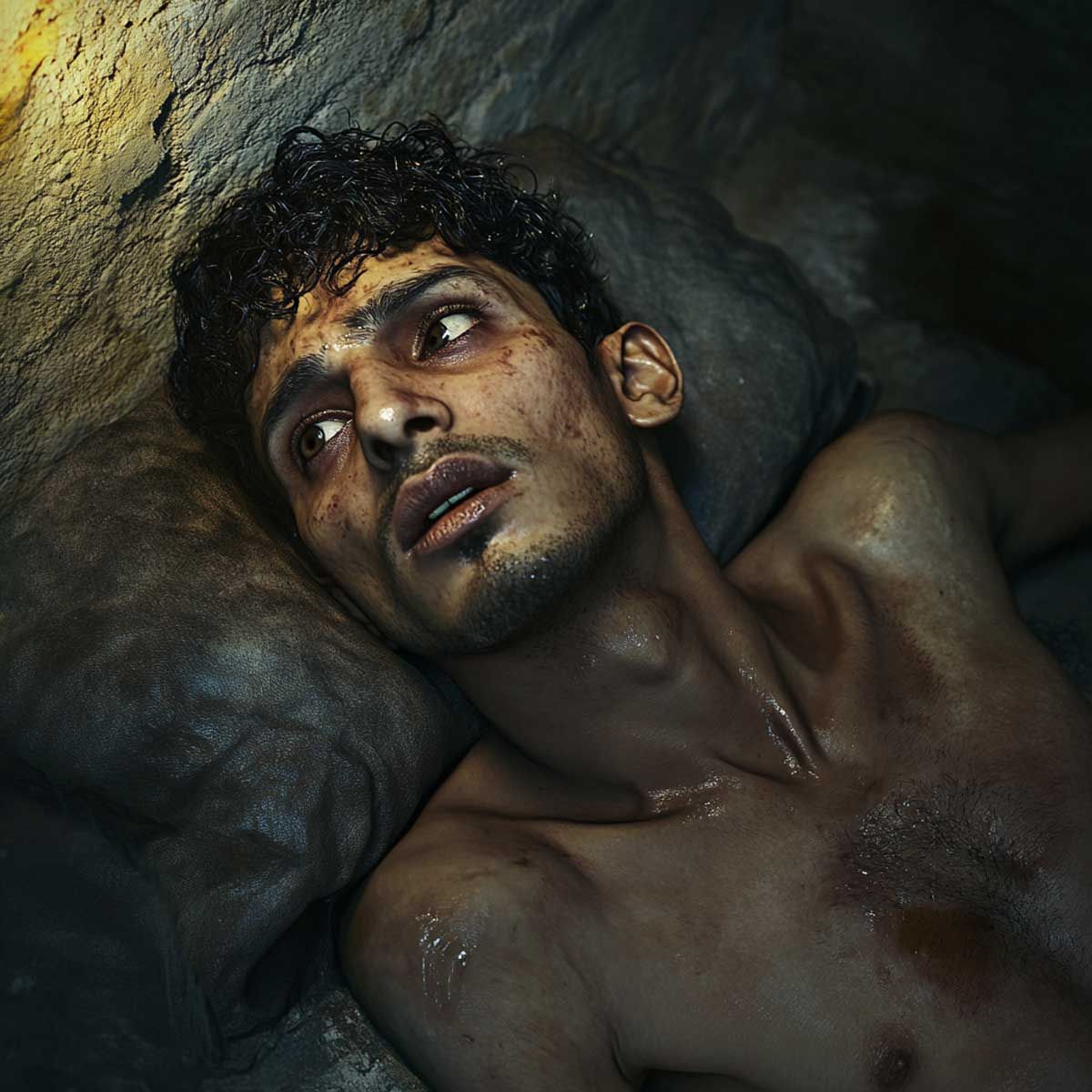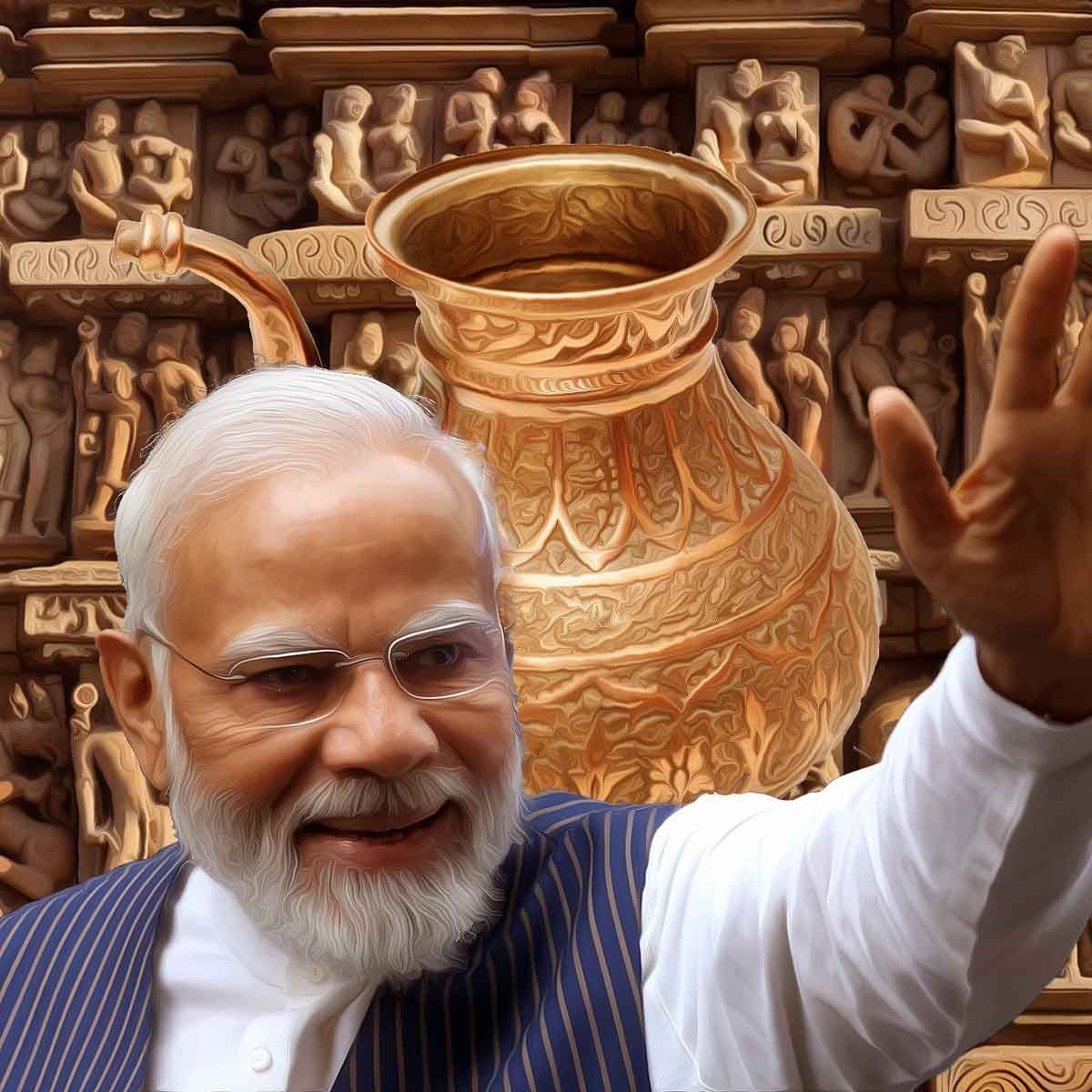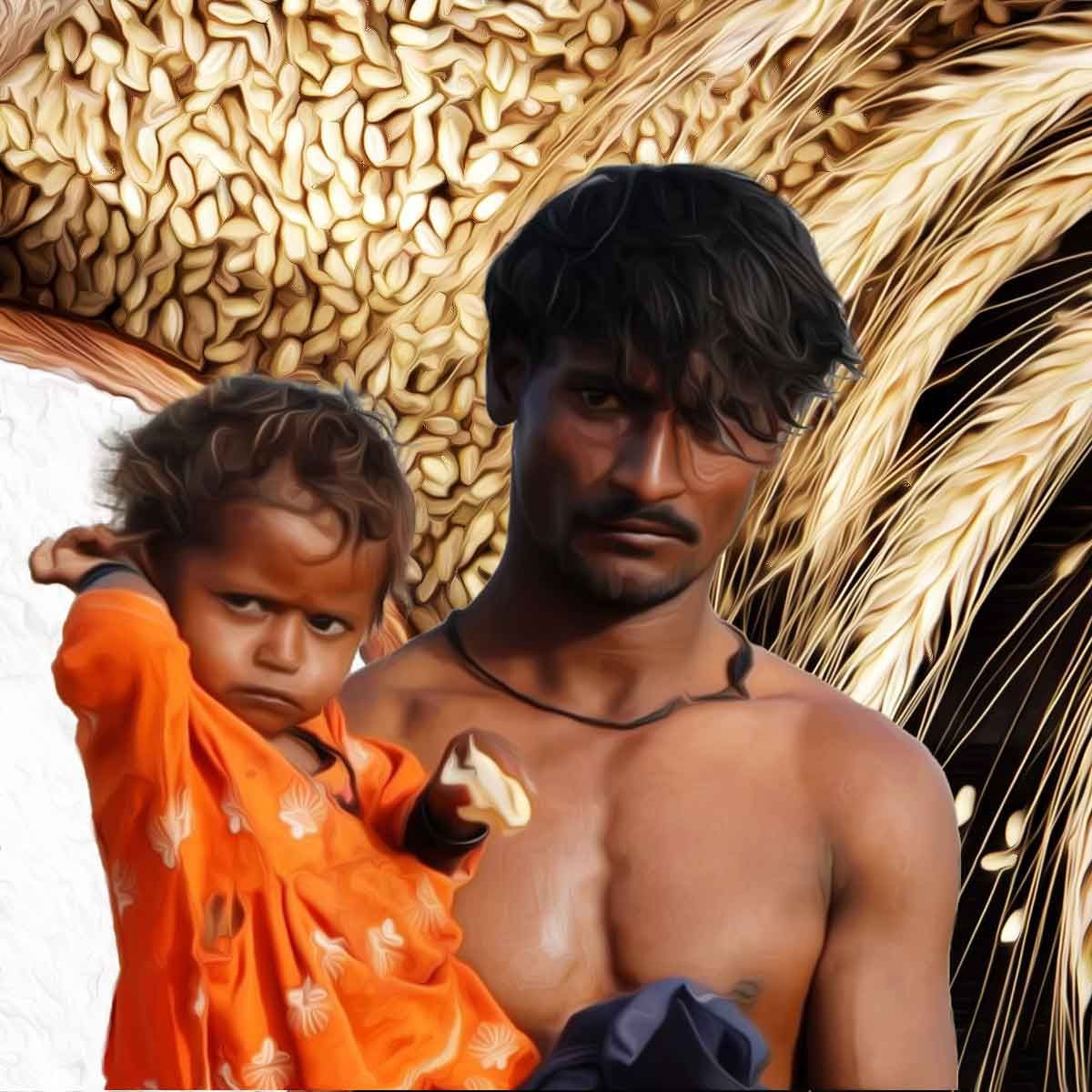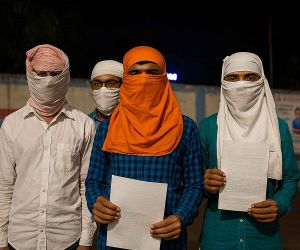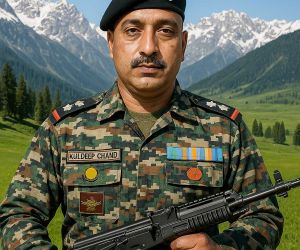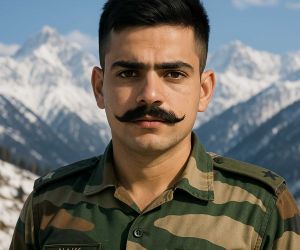MORE COVERAGE
Twitter Coverage
Satyaagrah
Written on
Satyaagrah
Written on
Satyaagrah
Written on
Satyaagrah
Written on
Satyaagrah
Written on
JOIN SATYAAGRAH SOCIAL MEDIA
"Better to die fighting for freedom than be a prisoner all the days of your life": Unarmed Iranians walk towards police, one by one, opening up their arms, shouting; “we are not scared of bullets, kill us”, nation mourns 40th day of Mahsa Amini death
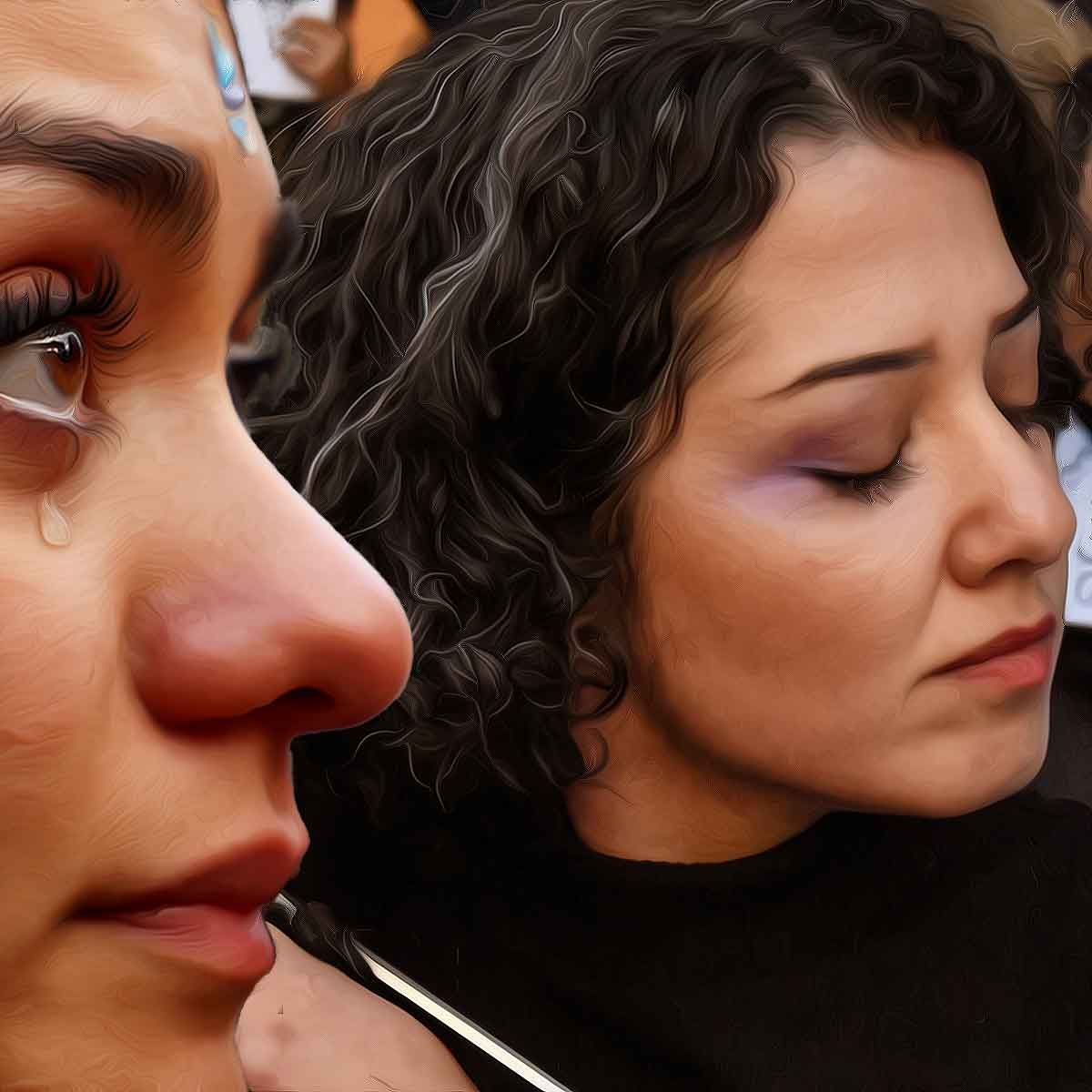
Western powers have tightened the screws on several Iranian institutions as protests continue to sweep the country. They include the feared morality police, which has become the focus of attention after 22-year-old Kurdish Iranian Mahsa Amini died in its custody, triggering the outpouring of anger.
|
The fearless Iranian youth is so desperate that even death no longer frightens them, and are willing to die for the freedom of their generation.
In a viral video from the Iranian city of Amol, the Anti-hijab activists were seen on their knees in front of armed security forces shouting, “shoot, we are not afraid of your bullets”. The video was shared by Iranian journalist Masih Alinejad on Twitter.
“I am in awe. These unarmed men and women walking towards security forces, one by one they open up their arms and shout; we are not scared of bullets, kill us. This is Amol city where dozens of protesters got killed over the past months, ” she said.
Some female students at Isfahan’s University of Medical Sciences were seen waving their headscarves in the air chanting ‘freedom, freedom, freedom.’
Times Square in New York City was also seen with the slogan of Iran’s nationwide protests, ‘Woman, Life, Freedom’.
|
In Saqez, the hometown of Mahsa Amini, tens of thousands of people showed up to mourn her on the 40th day of her killing, ignoring governmental threats and roadblocks.
Amini, a 22-year-old Iranian of Kurdish origin, died three days after being arrested in Tehran by the notorious morality police for allegedly violating the Islamic dress code for women.
Anger erupted at her funeral, sparking widespread protests in which young women led the charge, burning their headscarves and confronting security forces in the Islamic republic’s worst wave of unrest in years.
|
Despite increased security, columns of mourners poured into Saqez in western Kurdistan province to pay their respects at Amini’s grave at the end of the traditional mourning period.
|
What are the morality police?
The morality police, formally known as Gasht-e Ershad (Guidance Patrols), is part of the national police force tasked with ensuring compliance with Iran's Islamic values, including dress code. It's unclear how many men and women work for the force, but they have access to arms and detention centres, as well as what are called "re-education centres".
Women can be stopped by the morality police if they are considered to be "improperly" wearing hijab, or headscarf, and taken into custody.
Inside the "re-education centres", detainees are given classes on the importance of the hijab, and then forced to sign a pledge to abide by the state's clothing regulations before they are released. Many women resist detention and, as a result, are arrested by force.
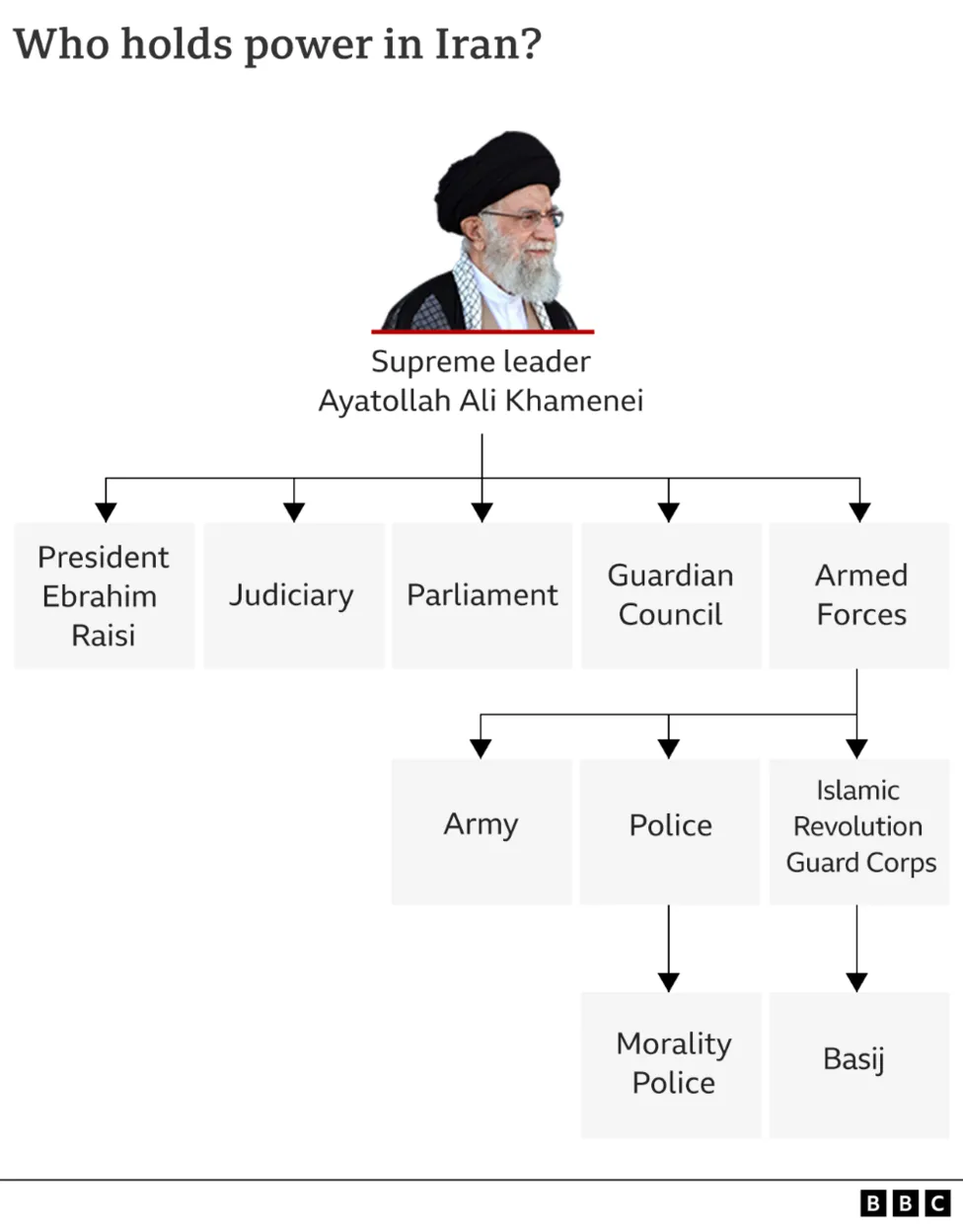 |
The arrest of Mahsa Amini in Tehran on 13 September (she died three days later in a coma) for allegedly violating the hijab rules is the most recent case. There were reports that officers beat her head with a baton and banged her head against one of their vehicles while detaining her. However, authorities blamed her death on an underlying health condition - something her family denied.
What will be the impact of sanctions?
The sanctions are likely to be most effective against those thinking of joining the morality police. Some join the force not out of ideological reasons but to makes ends meet. Others do not join voluntarily but to serve mandatory military service.
To impose a travel ban on these foot soldiers might impact the morality police's recruitment campaigns in a negative way.
However, the joint efforts of the Western countries to sanction Iran's institutions such as the morality police, Evin prison or Basij forces are unlikely to change the regime's behaviour.
Some activists and social media users want to focus the sanctions on the relatives and children of official figures who live outside Iran. Others want more targeted political measures to put pressure on Iran to stop the killing or detention of more people.
One, Hamed Esmailion, is the spokesperson for families of victims of the Ukrainian passenger plane that was shot down by Iranian forces over Tehran two years ago (in what Iran said was an accident).
He is the figure behind the call for the huge rally that took place in Berlin last week. It is believed to have been the biggest so far held by the Iranian diaspora.
Mr Esmailion has now called on leaders of the G7 group of the world's most advanced economies to expel Iran's diplomats, and has gathered around 700,000 signatures in support of a petition.
Many people believe the toughest sanctions on individuals known to be responsible for human right abuse in Iran will render pointless because most of the officials listed are unlikely to have any assets to be frozen in the US, Canada or Europe.
|
Who is suppressing the protests?
During the past five weeks, thousands of Iranians have protested against the clerical establishment in over 100 cities. Videos on social media show a crackdown by security forces that has included the use of live fire, beatings and sexual assaults.
|
The Oslo-based Iran Human Rights group has said at least 234 people, including 29 children, have been killed. The true figure is believed to be much higher. Iran's Human Rights Activists News Agency (HRANA) estimates that 13,309 people have been detained, many of them young people and children.
A lack of clarity about exactly which forces are taking part in the brutal repression has made it difficult for Western sanctions to target those involved in the human rights violations.
However, different branches of Iran's police, including Naja Special Forces Unit and what is called Nopo (Guardians of the Islamic Jurist Special Forces); different groups in Islamic Revolutionary Guard Corps (IRGC) such as members of the paramilitary Basij Resistance Force; and plainclothes agents are part of the security apparatus on the ground, having been seen in videos posted on social media.
|
What about Iran-Western ties?
Some activists - especially those outside Iran - want Western countries to go beyond making public messages of support and introducing new sanctions.
And it seems that this will not happen until or unless Iran is closer to a tipping point where the regime becomes quite dysfunctional, or its security forces are being undermined. Foreign governments would also look for signs of an opposition leadership leadership figure to emerge.
At this point, it doesn't seem that Western countries are prepared to cut diplomatic ties with Iran. US Democrats last week - concerned it could impact on nuclear talks with Iran - did not support a bill introduced by Republicans to sanction Iran's Supreme Leader, Ali Khamenei and its president, Ebrahim Raisi.
|
Who or what has been sanctioned?
The UK Foreign, Commonwealth and Development Office (FCDO) said sanctions were being slapped on the chief of the morality police, Mohammad Rostami Cheshmeh Gachi, and the head of its Tehran Division, Haj Ahmad Mirzaei, in response to Mahsa Amini's death.
Separately, sanctions were also imposed on three security officials for committing serious human rights violations.
They include:
- the head of the Basij force, Gholamreza Soleimani
- the commander of the Naja Special Forces Unit, Hassan Karami
- the commander-in-chief of the Iranian police, Hossein Ashtari
- a former governor of Shahr-e Qods province, Leila Vaseghi
- the commander of the Islamic Revolutionary Guard Corps (IRGC) in Khuzestan province, Hassan Shahvarpour
The EU said it was imposing sanctions on 11 people and three other organisations besides the morality police. Two morality police key figures, Mohammad Rostami and Hajahmad Mirzaei, are among the 11 sanctioned.
In addition, the EU sanctioned the Iranian Law Enforcement Forces (LEF) as well as a number of its local commanders for their role in the repression.
Moreover, the EU introduced sanctions against Issa Zarepour, the Iranian Minister of information and Communications Technology, for severely disrupting the internet and hampering the ability of protesters to post on social media.
Canadian sanctions cover institutions such as the Guardian Council and Assembly of Experts as well as thousands of IRGC members who will be barred from entering the country.
It has also sanctioned many officials, including the former Iranian Foreign Minister Mohammad Javad Zarif; Amir Hatami, an army general and former defence minister; and Saeed Mortazavi, an Iranian prosecutor who Canada says ordered the torture of Canadian Iranian journalist Zahra Kazemi. Kazemi died as a result of her mistreatment while in custody in 2003.
The US treasury department has sanctioned seven senior leaders of Iran's security organisations, including the morality police; the ministry of intelligence and security; the army's ground forces; the Basij; and the LEF.
In response, Iran has issued its own sanctions against several British organisations and individuals for their alleged "incitement of riots" and "support of terrorism".
The Iranian sanctions include a ban on the granting of visas and entry into Iran, as well as the seizure of designated individuals' assets there. Those targeted include the British government's Communications Headquarters GCHQ; BBC Persian; Iran International TV; and the UK's Minister of State for Security, Tom Tugendhat.
References:
 Support Us
Support Us
Satyagraha was born from the heart of our land, with an undying aim to unveil the true essence of Bharat. It seeks to illuminate the hidden tales of our valiant freedom fighters and the rich chronicles that haven't yet sung their complete melody in the mainstream.
While platforms like NDTV and 'The Wire' effortlessly garner funds under the banner of safeguarding democracy, we at Satyagraha walk a different path. Our strength and resonance come from you. In this journey to weave a stronger Bharat, every little contribution amplifies our voice. Let's come together, contribute as you can, and champion the true spirit of our nation.
 |  |  |
| ICICI Bank of Satyaagrah | Razorpay Bank of Satyaagrah | PayPal Bank of Satyaagrah - For International Payments |
If all above doesn't work, then try the LINK below:
Please share the article on other platforms
DISCLAIMER: The author is solely responsible for the views expressed in this article. The author carries the responsibility for citing and/or licensing of images utilized within the text. The website also frequently uses non-commercial images for representational purposes only in line with the article. We are not responsible for the authenticity of such images. If some images have a copyright issue, we request the person/entity to contact us at satyaagrahindia@gmail.com and we will take the necessary actions to resolve the issue.
Related Articles
- "Bravery births revolution": Iranian student strips down outside Tehran’s Islamic Azad University in a protest against Basij militia harassment, she later fell into a coma at noon, reportedly after being tortured by security guards, echoing Mahsa Amini
- "Like ocean waves crashing against the shore, the memories remain long after this goodbye": 20 year old Iranian girl, Hadis Najafi becomes a new symbol of defiance as she put her hair in a bun before confronting armed law enforcement officers empty-handed
- "Empires won by conquest have always fallen either by revolt within or by defeat by a rival": 18-year-old Mahsa Mogoi shot dead by police in Iran while protesting the murder of Mahsa Amini amidst ongoing protests over mandatory wearing of hijab in public
- "The story of life is quicker than the blink of an eye, the story of love is hello, goodbye": Nika Shakarami 17, vanished during the protest over the murder of Mahsa Amini, security forces delivered her dead body with her nose fully smashed, skull pounded
- "Iran is not a nation-state; it's a revolutionary cause devoted to mayhem": 22-year-girl Mahsa Amini suffered severe head injuries and died in the custody of Iran’s Hijab police, and nationwide protests erupted by women in Iran against ‘Moral policing’
- ‘Islam Zindabad’: In Darbhanga, Bihar, a Hindu procession for Maa Saraswati iodl's immersion faced stone pelting by Islamic extremists, including Faizan, Tabrez among 14 arrested, FIR on 200+, uncovering a plot of pre-planned communal discord
- "Gunah-e-Kabira": A Muslim couple, along with their Hindu female friend were learning scooty at a secluded place, Junaid arrived with others and gang-raped the Hindu girl, couple watched without any signs of resistance, police probe possible involvement
- 'Have more children and that is how we grab power' says AIMIM leader while inciting Muslims: Viral video
- Five LeT terrorists planned bomb blast at Darbhanga railway station, had visited Pakistan several times: NIA files charge-sheets
- "I knew there was an old axe down cellar; its all I knew": Muslim migrant Kosovar ch0ps up Ukrainian woman with axe in Germany, police shoot perpetrator, Islam doesn’t teach that man may kill his wife or girlfriend, but you’ve allowed him to beat her, SO?
- “Emotional scars run deeper than the Nile and often lie lurking behind a smile”: Salman Ansari raped a 10-year-old Hindu girl who was returning home from Durga puja fair, victim's parents beaten for confronting, medical examination confirmed the rape
- "There is always more spirit in attack than in defence": VHP released a statement, "If Jihadi violence continues, there will be a reaction, and Hindus won’t be responsible for it", cases of Jihadi violence and beheadings to be tried in fast-track courts
- Bajrang Dal's peaceful rally in Mewat (mini Pakistan) is painted panic mongering by Islamist Media
- Online Syndicate of radical Islamists that was targeting people for demanding justice for the slain Hindu Youth is exposed by Social Media user: Kishan Bharwad murder case
- Shoaib Akhtar endorses AMU founder’s two-nation theory that caused partition: Not some stupid comment but a statement of fact






